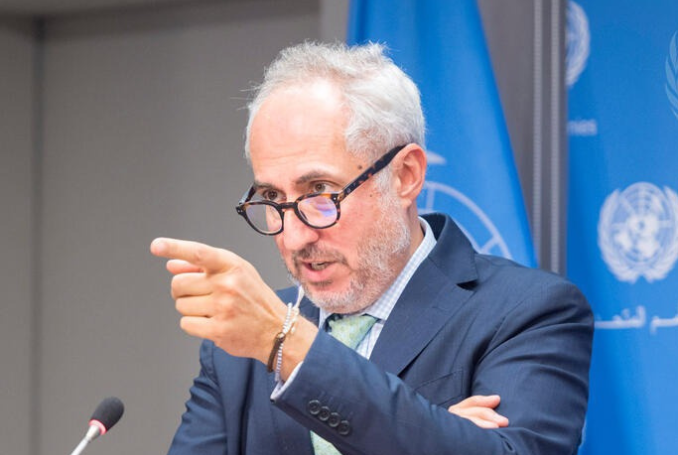
Dujarric said that the inability to reach these areas has resulted in grave consequences namely the halt of bakeries and kitchens in northern Gaza.
The Spokesman for the United Nations Secretary-General, Stéphane Dujarric, said on Tuesday that Palestinians trapped in northern Gaza have been struggling to stay alive “with virtually no assistance for more than 40 days.”
Quoting the Office of the Coordination of Humanitarian Affairs (OCHA), Dujarric revealed that the UN’s efforts to reach people in northern Gaza have failed.
“All attempts by the UN to support people in Beit Hanoun, Beit Lahiya and parts of Jabalya — all of which remain under siege — have been either denied or impeded,” the UN official said at a press brief.
“This month alone, 27 out of 31 planned missions were rejected — and the other four were severely impeded, meaning they were prevented from accomplishing all of the critical work they set out to do,” Dujarric added.
The UN spokesperson echoed the report by the IPC (Integrated Food Security Phase Classification) Famine Review Committee issued 11 days ago stating “that parts of northern Gaza face an imminent risk of famine — and that immediate action is needed in days, and not weeks.”
Dujarric said that the inability to reach these areas has resulted in grave consequences namely the halt of bakeries and kitchens in northern Gaza, in addition to the suspension of nutrition support and the complete blockade of refueling of water and sanitation facilities.
REPORT: Israeli army forced food off trucks before allowing entry to north Gaza, says UN’s Office for the Coordination of Humanitarian Affairs, (OCHA).
➤ UN spokesperson Stéphane Dujarric says aid efforts in northern Gaza are being systematically blocked. All food and medical… pic.twitter.com/PxsWGnpnal
— Drop Site (@DropSiteNews) November 20, 2024
Hospitals under Siege
The UN spokesperson said that access to Kamal Adwan, Al Awda and Indonesian Hospitals “remains severely restricted, amid desperate shortages of medical supplies, blood units and fuel.”
Dujarric noted that the Israeli occupation authorities continue to block attempts by UN partners to “deploy an international emergency medical team to scale up capacity.”
“On Sunday, OCHA supported a mission led by the World Health Organization (WHO) to Kamal Adwan Hospital. The team delivered 10,000 liters of fuel and transferred some 17 patients, three unaccompanied children, and nearly two dozen caregivers to Al Shifa Hospital in Gaza City,” he added.
However, Dujarric revealed that the Israeli occupation forces obliged the mission to offload food and some of the medical supplies intended for Kamal Adwan Hospital.
A mother and her children arrived at Al Aqsa hospital, having walked all the way from Beit Lahiya in northern Gaza. They carried with them only a few bags—holding their lives, their memories, and a bag of flour.
The exhaustion and fear were etched across their faces, the weight… pic.twitter.com/jYf1yt48mv
— Hind Khoudary (@Hind_Gaza) November 20, 2024
Genocide Continues
Flouting a UN Security Council resolution demanding an immediate ceasefire, Israel has faced international condemnation amid its continued brutal offensive on Gaza.
Currently on trial before the International Court of Justice for genocide against Palestinians, Israel has been waging a devastating war on Gaza since October 7.
According to Gaza’s Ministry of Health, 43,972 Palestinians have been killed, and 104,008 wounded in Israel’s ongoing genocide in Gaza starting on October 7, 2023.
Moreover, at least 11,000 people are unaccounted for, presumed dead under the rubble of their homes throughout the Strip.
LIVE BLOG: Hezbollah Drone Hits Israeli Military Camp | Massacre in Jabaliya – Day 411
Israel says that 1,200 soldiers and civilians were killed during the Al-Aqsa Flood Operation on October 7. Israeli media published reports suggesting that many Israelis were killed on that day by ‘friendly fire’.
Palestinian and international organizations say that the majority of those killed and wounded are women and children.
The Israeli war has resulted in an acute famine, mostly in northern Gaza, resulting in the death of many Palestinians, mostly children.
The Israeli aggression has also resulted in the forceful displacement of nearly two million people from all over the Gaza Strip, with the vast majority of the displaced forced into the densely crowded southern city of Rafah near the border with Egypt – in what has become Palestine’s largest mass exodus since the 1948 Nakba.
Later in the war, hundreds of thousands of Palestinians began moving from the south to central Gaza in a constant search for safety.
(The Palestine Chronicle)
